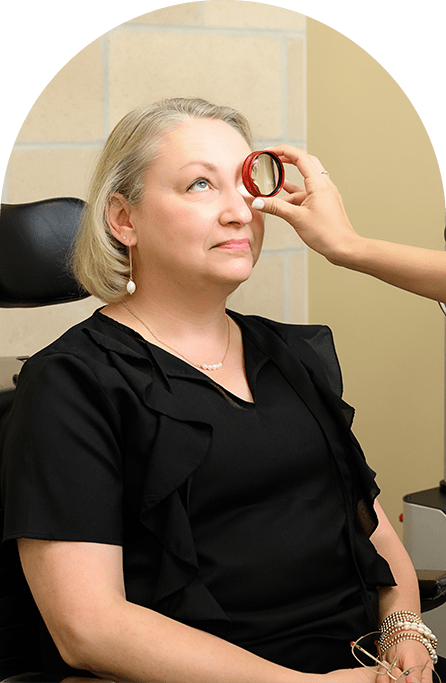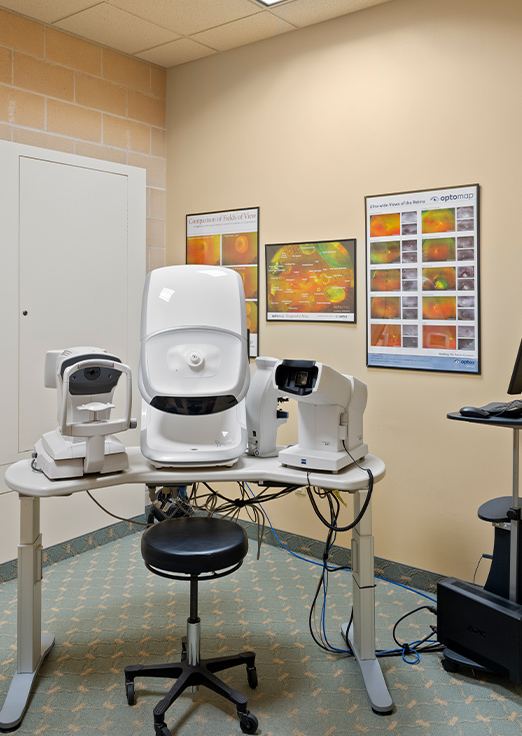Eye Exams Are Needed at Every Age
An eye exam offers us a complete picture of your eye health. Certain eye diseases and conditions can develop without presenting symptoms, so it’s essential to schedule routine eye exams to prevent future vision problems.
Our comprehensive eye exams allow us to dive deep into your overall visual health. Vision Veritas pays meticulous attention to every detail and image we gather about your eyes.
We can detect oncoming or existing eye conditions using our advanced equipment and provide customized treatment that suits your lifestyle. After your exam, we may suggest further testing to ensure the health of your eyes. Or, you could be ready to peruse the latest trends in eyeglasses frames or get set up with contact lenses.
Start your path towards better eye health with our compassionate team at Vision Veritas. We’re waiting for you!



How Often Should I See an Eye Doctor?
Surprisingly, adults who report vision problems rarely see an eye doctor for a solution. Now imagine the number of people who don’t even notice symptoms. Having a routine eye exam can help avoid future visual problems and potentially save your eyesight.
Vision Veritas recommends annual eye exams. Of course, each patient’s risk factors are different and can evolve with age. During your appointment, you and your optometrist can discuss the best eye exam schedule for you based on your risk factors, eye health history, and any eye issues you may have.
What to Expect During an Eye Exam
At Vision Veritas, you’ll be greeted by our smiling staff, who are excited to be a part of your eye care experience. We strive to ensure your comfort and understanding at every step. So don’t hesitate to stop us and ask a question—that’s what we’re here for!
Depending on your unique needs, your eye exam may involve:
- Discussion about your family and personal medical history, and your visual needs and concerns
- Visual acuity testing to measure the clarity and sharpness of your eyesight
- Refractive evaluation to diagnose whether you need eyeglasses or contact lenses
- Eye muscle testing to identify weak eye movements
- Glaucoma testing to measure intraocular fluid pressure
- External eye exam to check the health of the cornea, iris, lens, and surrounding tissue
- Non-invasive exam of the back of your eye, retina, and underlying blood vessels
If the results show a clean bill of health, we suggest you return regularly for a checkup (and to say hi!). In cases where you have refractive errors or other eye diseases present, we’ll provide a clear and customized treatment plan for you.



Eye Issues That Can Arise As We Age
Much like getting grey hairs or finding it harder to keep up with your young ones, your eye health can weaken with age. That said, many eye issues that appear during the aging process can be treated without sacrificing your quality of life.
Once you pass 65, we will pay specific attention to the 4 typical eye issues you might face. We want to get to your eye conditions before they get you.
Glaucoma
Glaucoma is a group of eye conditions that affect the optic nerve. It causes high pressure in your eye and can progress without showing symptoms.
As one of the leading causes of blindness in people over 60, glaucoma testing can potentially save your eyesight. An eye exam is the only way to detect glaucoma before it progresses into vision loss that can’t be repaired.
Cataracts
Almost everyone develops cataracts since its primary cause is inevitable: aging. Symptoms of cataracts include blurred or foggy vision, light sensitivity, and seeing halos around lights.
Cataracts form on the lens, which is responsible for focusing light that enters the iris. As we age, the lens becomes more rigid, and tissues harden and form clumps, causing opaque spots.
Maintain your regular checkups with the optometrist to detect cataracts and find the best treatment for your lifestyle.
Age-Related Macular Degeneration
Age-related macular degeneration (AMD) affects the macula, a tiny but crucial part of the eye in the center of the retina. Early symptoms often don’t appear, but later, symptoms of AMD can blur your central vision, making it harder to see details.
If your eyes show signs of AMD, we will keep close track of how it progresses. Scientists continue to study AMD and possible treatments, so if you struggle with this eye issue, the future could be brighter (and clearer).
Diabetic Retinopathy
Diabetic retinopathy is an eye condition that can develop among patients with diabetes (type 1 and type 2). When the bloodstream has elevated glucose levels, the blood vessels in the eyes can swell and leak into the retina.
There are 4 stages of diabetic retinopathy that increase in severity as the condition progresses. A specialized diabetic eye exam is available for patients with diabetes. Visit us to test for diabetic retinopathy, so we can detect it in its early stages before it progresses.
We See Clearer Vision in Your Future
Age is just a number, right? It doesn’t matter to us how old you are—but your eye health matters immensely. Book your appointment at Vision Veritas so our optometrists can ensure you’re on the path to clearer vision.
Let our family take care of yours!
Find Us In Dallas

Wanna see what
we’re all about?
Our office is on the northwest corner of Prestonwood Boulevard and Beltline Road near the Panera Bread.
Our Address
- 15123 Prestonwood Blvd, Ste 120
- Dallas, TX 75248
Contact Information
- Phone: 214.253.2000
- Fax: 214-253-2478
- Email: info@visionveritaseyecare.com
Hours of Operations
- Monday: 9:00 AM – 6:00 PM
- Tuesday: 10:00 AM – 7:00 PM
- Wednesday: 9:00 AM – 6:00 PM
- Thursday: 9:00 AM – 6:00 PM
- Friday: 9:00 AM – 5:00 PM
- Saturday: Closed
- Sunday: Closed
Our Eye Care Services
Our Brands














